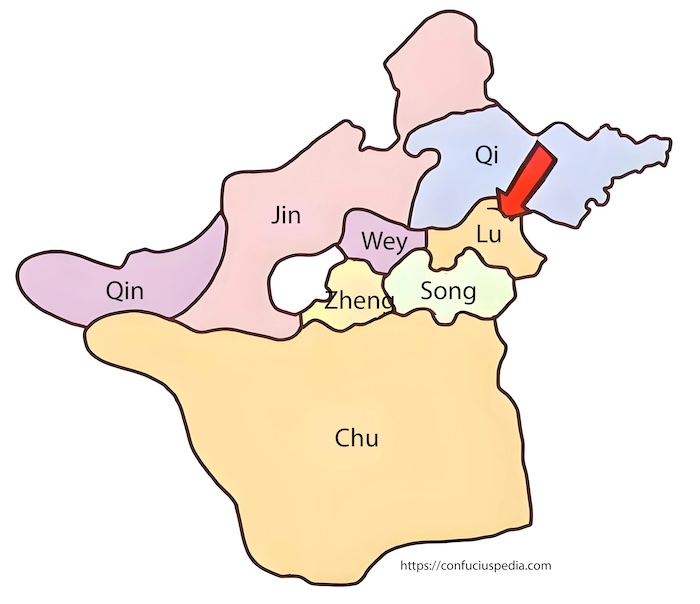Question:
I am particularly interested in ancient Chinese culture, especially Confucianism. The Spring and Autumn Period and the Warring States Period were times of war. There were frequent wars among different states, and the borders of different states often changed. I know that Confucianism was born in this period. But where exactly did it come from?
—– Asked by Schipper
Answer:
Lu State (鲁国), a vassal state during the Spring and Autumn Period, located in present-day Shandong Province, is the birthplace of Confucianism.
The core principles of Confucianism, including “benevolence,” “righteousness,” “propriety,” “wisdom,” and “trustworthiness,” have profoundly influenced global culture and social structures to this day.
So, why did Lu become the origin of the Confucian thought?
This is closely tied to Lu’s historical and geographical context, its rich cultural heritage, the intellectual innovations of Confucius, and the social environment of the time.
1. Historical and Geographical Foundations: Lu’s Cultural Roots
Located in the south-central part of present-day Shandong Province (山东省), the state of Lu was strategically positioned at the core of the Central Plains Cultural Circle, adjacent to the state of Qi (齐国).
This geographical advantage made Lu an essential cultural and political crossroads during the Spring and Autumn Period and one of the key centers for disseminating Central Plains culture and Zhou rituals.
As a vital bearer of Zhou ritual culture, Lu provided favorable conditions for the birth and spread of Confucianism.
Historically, the state of Lu was an important vassal state of the Zhou dynasty, founded by Bo Qin (伯禽), the first-born son of the renowned Zhou Gong Dan (周公旦).
Zhou Gong Dan was a political reformer and a key advocate for Zhou rituals and music, which emphasized morality and social order. His profound cultural influence brought the Zhou ritual and music system to Lu, laying a strong foundation for Confucianism.
Confucius, who grew up in Lu, was deeply affected by this cultural heritage, and the environment of ritual and music in Lu greatly contributed to the development of Confucian thought.
2. Cultural and Intellectual Context: Rituals, Music, and Cultural Exchange
Lu’s adoption of the Zhou ritual system played a crucial role in the development of Confucianism. As a vassal state of the Zhou dynasty, Lu was entitled to the rites and music of the emperor and strictly adhered to Zhou rituals. These rituals encompassed religious ceremonies, formal protocols, and moral and social codes.
Confucius inherited and deepened these practices, making “rites” central to his philosophy. He emphasized that rites were not merely external norms of behavior but also an expression of internal moral cultivation. The strong ritual and musical tradition in Lu thus provided the cultural foundation for the spread of Confucianism.
Cultural exchange between Lu and its neighboring state, Qi, played a crucial role in shaping Confucianism. While Qi’s culture was focused on practicality and utilitarianism, Lu’s culture was grounded in ritualistic and moral traditions.
This cultural blending allowed Confucianism to evolve into a philosophy that balanced profound moral and cultural principles with practical guidance for social changes, making it both ethically profound and pragmatically adaptable to different cultural contexts.
3. Confucius and the Birth of Confucianism
Confucius, the founder of Confucianism, lived in the state of Lu, where he was not only a citizen but also a member of the aristocratic class. His education and philosophical development were deeply shaped by the rich cultural traditions of Lu.
Through extensive study and reflection, Confucius developed his own unique philosophical system. Central to his thought was the concept of “benevolence” (ren), which emphasizes moral cultivation and social responsibility.
He advocated a political philosophy based on the idea of “cultivating oneself (修身), harmonizing the family (齐家), governing the state (治国), and bringing peace to the world (平天下).” These ideas were not only a response to the social turmoil of the Spring and Autumn Period, but also provided a framework for governance that influenced the later feudal society.
Confucius’s teachings were widely inherited and promoted by his disciples, especially in the state of Lu, where Confucian classics such as The Analects of Confucius, The Great Learning, and The Doctrine of the Mean were extensively disseminated and revered. These works contain profound philosophical insights and hold great literary value, drawing the attention of numerous scholars and cultural enthusiasts.
The intellectual climate in Lu, with its academic traditions and freedom of thought, provided fertile ground for Confucius to develop thoughts and ideas to develop Confucianism.
4. Social and Political Environment: Social Stability and Intellectual Diversity
During the Spring and Autumn Period, the state of Lu enjoyed relative political stability, especially under the reigns of Duke Huan of Lu (鲁桓公), Duke Zuang of Lu (鲁庄公), and Duke Xi of Lu (鲁僖公). Although Lu faced growing tensions with neighboring states, such as Qi, its internal stability secured the thriving intellectual and philosophical development, promoting the spreading of Confucianism.
In addition, as an economically and culturally more independent vassal state, Lu’s relative isolation from the warring regions of the Central Plains allowed it to develop a more diverse social environment. Removed from the pressures of constant warfare, Lu gradually focused more on morality, ethics, and social order, fostering a more tolerant and pluralistic intellectual environment.
Conclusion
In conclusion, Lu became the birthplace of Confucianism due to its favorable geographical location, the rich historical and cultural heritage, inheritance of Zhou rituals, the intellectual climate fostered by Confucius, and the stability and intellectual diversity of that time. These factors create an environment where Confucianism emerged and thrived, influencing not only China but also East Asia. Lu’s cultural, political, and social strengths played a pivotal role in the formation and spread of Confucian thought, making it an integral part of Chinese civilization.


Leave a Reply